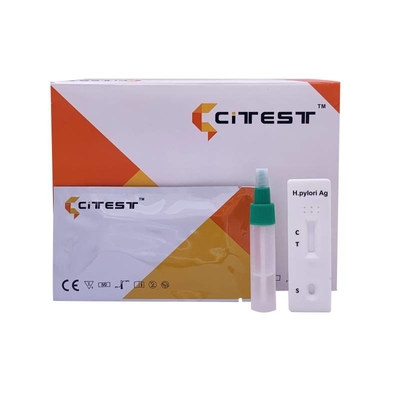

H.Pylori Antigen Rapid Test Cassette Lateral Flow Immunochromatographic Assays
| Principle | Chromatographic Immunoassay |
| Format | Dipstick, Cassette |
| Specimen | Feces |
| Certificate | CE/CE0123 |
| Reading Time | 5 minutes |
| Pack | 1T/25 T |
| Storage Temperature | 2-30°C |
| Shelf Life | 2 Years |
A rapid test for the qualitative detection of Helicobacter pylori (H.pylori) antigens in human feces. For self-testing in vitro diagnostic use only.
Applications:
The H.pylori Antigen Rapid Test Cassette (Feces) is a rapid chromatographic immunoassay for the qualitative detection of H.pylori antigens in human feces specimens to aid in the diagnosis of H.pylori infection.
Description:
H.pylori is a small, spiral-shaped bacterium that lives in the surface of the stomach and duodenum. It is implicated in the etiology of a variety of gastrointestinal diseases, including duodenal and gastric ulcer, non-ulcer dyspepsia and active and chronic gastritis.1,2 Both invasive and non-invasive methods are used to diagnose H.pylori infection in patients with symptoms of gastrointestinal disease. Specimen-dependent and costly invasive diagnostic methods include gastric or duodenal biopsy followed by urease testing (presumptive), culture, and/or histologic staining.
A very common approach to the diagnosis of H.pylori infection is the serological identification of specific antibodies in infected patients. The main limitation of serology test is the inability to distinguish current and past infections. Antibody may be present in the patient’s serum long after eradication of the organisms.
HpSA (H. pylori Stool Antigen) testing is gaining popularity for diagnosis of H. pylori infection and also for monitoring the efficacy of the treatment of H. pylori infection. Studies have found that more than 90% of patients with duodenal ulcer and 80% of patients with gastric ulcer are infected with H.pylori.
The H.pylori Antigen Rapid Test Dipstick (Feces) is a rapid chromatographic immunoassay for the qualitative detection of H.pylori antigens in human feces specimens, providing results in 10 minutes. The test utilizes antibodies specific for H. pylori antigens to selectively detect H.pylori antigens in human feces specimens.
How to use?
Before performing the test, stool samples must be collected following the instruction below.
1. Wash your hands with soap and rinse with clear water.
2. To collect fecal specimens:
The stool specimen should be collected in the stool collection paper or clean collection containers. Please use the stool collection paper, avoiding contamination of the specimen by taking precautions that the specimen or side of paper containing specimen does not come in contact with any contaminating objects including toilet cleaners.
3. To process fecal specimens:
Unscrew the cap of the specimen collection tube,then randomly stab the specimen collection applicator into the fecal specimen in at least 3 different sites. Do not scoop the fecal specimen. Screw on and tighten the cap onto the specimen collection tube, then shake the specimen collection tube vigorously to mix the specimen and the extraction buffer.
4. Bring the pouch to room temperature before opening it. Remove the test cassette from the foil pouch and use it as soon as possible. Best results will be obtained if the test is performed immediately after opening the foil pouch.
5. Open the cap of the specimen collection tube and break the tip. Invert the specimen collection tube and transfer 2 full drops of the extracted specimen to the specimen well (S) of the test cassette, then start the timer. Avoid trapping air bubbles in the specimen well (S).
6. Read results at 10 minutes. Do not read results after 20 minutes.
![]()
![]()
LIMITATIONS
1. The H.pylori Antigen Test Cassette (Feces) is for in vitro diagnostic use only. The test should be used for the detection of H.pylori antigens in feces specimens only. Neither the quantitative value nor the rate of increase in H.pylori antigens concentration can be determined by this qualitative test.
2. The H.pylori Antigen Test Cassette (Feces) will only indicate the presence of H.pylori in the specimen and should not be used as the sole criteria for H.pylori to be etiological agent for peptic or duodenal ulcer.
3. As with all diagnostic tests, all results must be interpreted together with other clinical information available to the physician.
4. If the test result is negative and clinical symptoms persist, additional testing using other clinical methods is recommended. A negative result does not at any time preclude the possibility of H.pylori infection.
5. Following certain antibiotic treatments, the concentration of H.pylori antigens may decrease to the concentration below the minimum detection level of the test. Therefore, diagnosis should be made with caution during antibiotic treatment.
Order Information
| IHP-302 | H. pylori Antibody Rapid Test Cassette | S / P | Cassette | 25 T |
| IHP-402 | H. pylori Antibody Rapid Test Cassette | WB/S/P | Cassette | 25 T |
| IHP-602 | H. pylori Antigen Rapid Test Cassette | Feces | Cassette | 25 T |
| IHP-602H | H. pylori Antigen Rapid Test Cassette | Feces | Cassette | 1 T |
| IHP-CT607 | H. pylori Antigen Rapid Test | Feces | Cup | 1T/10T |